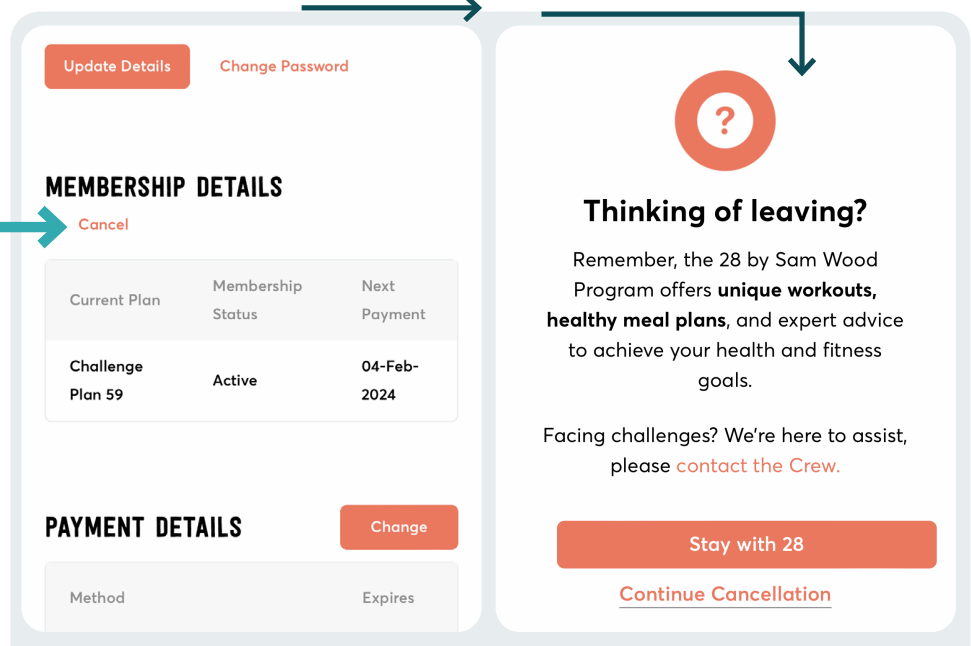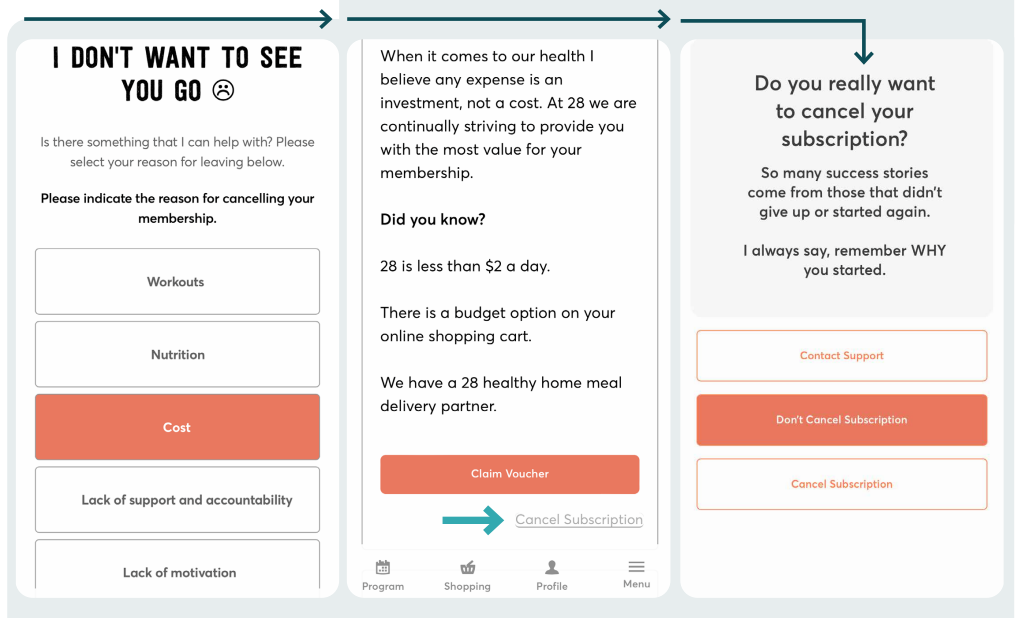A TV star’s fitness app has been called out by consumer advocates for its “cumbersome” subscription model after an investigation found Australian companies regularly try to trick their customers into continuing subscriptions they don’t want.
A report by the Consumer Policy Research Center (CPRC) surveyed 1,000 Australians about their experiences with subscription traps, companies that make it difficult to cancel their services and trap customers by making the opt-out process long and laborious.
“Our research into ordering pitfalls found that three out of four Australians have had some sort of negative experience when canceling an order,” the report said.
“This may include pressure to maintain a subscription or cancel and continue paying for a service you no longer need.
“Many survey respondents found this practice annoying or deceptive.”
The Bachelor Sam Wood workout app 28 by Sam Wood was singled out in a survey as having a particularly difficult cancellation process for its $58.99 monthly service.
“Health and fitness services have always been notorious for making it difficult to unsubscribe, and their online versions are no exception,” the report said.
“Sam Wood’s 28-year-old online fitness program uses a false hierarchy throughout the cancellation process and reinforces shaming on multiple screens, making it difficult to quit the program.”

The first screens shown to the customer at the time of cancellation. ( Consumer Policy Research Center)

Customers have to click through several “confirmation shaming” pages before reaching the cancellation stage. (Consumer Policy Research Center)
Confirmation refers to the process of using language to induce guilt or negative emotions in customers when they choose not to engage with a service or feature.
False hierarchies are used to promote certain choices or obscure others.
“The unsubscribe link or button is either in fine print or a lighter color,” the report said.
“The process, which takes at least five screens, also includes grandiose assurances that the cost is an investment, further shaming consumers into continuing the cancellation process.”
A spokesman for Sam Wood 28 said the report had been noted.
“Improving our 28 by Sam Wood customer experience is an ongoing priority for our company,” they said.
“We are taking these findings into account and conducting an internal review.”
You can check in but never leave
CPRC Deputy CEO Chandni Gupta said the growing popularity of the subscription model has made things more difficult for consumers.

Chandni Gupta, Deputy Executive Director, Consumer Policy Research Center
“You can sign up at any time, but you can never leave; signing up only takes seconds, while canceling can be a difficult, frustrating and time-consuming ordeal,” he said.
The report found that 75 percent of customers had some kind of negative experience when canceling an order, and 30 percent felt pressured to keep an order they wanted to cancel.
Survey respondents also shared:
- The company did not notify me that my free trial was ending. Finally, they asked me for a large amount of money.
- Sent with fun automated choices and questions. Finally, contact a person who needs to convince you to stay and asks a lot of questions. It took about an hour to cancel over the phone.
- Canceling seems to involve multiple pages asking in very small print, “Are you sure…?”, as opposed to NEXT when signing up, and in some cases calls to the organization despite all other correspondence being electronic.
Consumer advocates demand changes to the law
Ms Gupta called on the Australian government to adopt similar legislation to the recent European Digital Services Act, which came into effect in February.
The aim of the law is to limit illegal content, transparent advertising and impose obligations on all digital services to better protect consumers.
“Australia is lagging behind in consumer protection – it’s time our laws caught up with global best practice,” he said.
A spokeswoman for the Australian Competition and Consumer Commission said some rules on subscription traps had already been introduced into Australian consumer laws.
“Companies using a subscription trap business model may be in violation of the ACL,” he said.
“For example, if a company makes a false or misleading representation at the registration or cancellation stage.
“Depending on the circumstances, failure to disclose or insufficient disclosure may constitute misleading or deceptive conduct under the ACL.”
A spokeswoman said the ACCC would continue to promote unfair trading practices in ACL to cover some of the wider issues outlined in the report.

Assistant Treasurer Stephen Jones said consumers were at the heart of the government’s economic plan. (ABC News: Ian Cutmore)
Aid funder Stephen Jones said the government was working on a solution.
“Practices like subscription traps or drip pricing are egregious business practices that are frustrating at best, but often have profound financial implications,” he said.
“There is no good reason for the consumer to simply give up on a product used by unscrupulous companies.
“The Albanian government has consulted on the prohibition of unfair trade practices and we are carefully working through options for reform.”
#Bachelors #fitness #app #microscope #subscription #trap #study